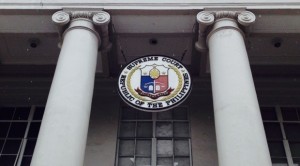SC: Persons behind DAP liable
MANILA, Philippines—Authors, proponents and implementors of the Disbursement Acceleration Program (DAP) may be held liable unless a proper tribunal found that they acted in good faith, the Supreme Court said in its decision that declared DAP as unconstitutional.
In its 92-page decision made public Wednesday evening, the high court through Associate Justice Lucas Bersamin said programs, activities and projects funded by DAP can be covered by the ‘operative fact doctrine.’
Under the operative fact doctrine, the law is recognized as unconstitutional but the effects of the unconstitutional law, prior to its declaration of nullity may be left undisturbed as a matter of equity and fair play.
“The doctrine of operative fact can apply only to the PAPs (programs, activities and projects) that can no longer be undone and whose beneficiaries relied in good faith on the validity of the DAP, but cannot apply to the authors, proponents and implementors of the DAP, unless there are concrete findings of good faith in their favour by the proper tribunals determining their criminal, civil, administrative and other liabilities,” the Supreme Court said.
The high court, in its ruling declared unconstitutional National Budget Circular 541 and other related issuances related to the DAP which was issued by the Department of Budget and Management (DBM). This is the source of DAP.
Article continues after this advertisementThe circular also allows “withdrawn allotments” to be used to “augment existing programs and projects of any agency [emphasis by DBM] and to fund priority programs and projects not considered in the 2012 budget but expected to be started or implemented during the current year,” Abad wrote department heads, including budget and accounting officers.
Article continues after this advertisementAlso declared in violation of Section 25 (5) Article VI of the 1987 Constitution are the following acts;
1. The withdrawal of unobligated allotments from the implementing agencies, and the declaration of the withdrawn unobligated allotments and unreleased appropriations as savings prior to the end of the fiscal year and without complying with the statutory definition of savings contained in the General Appropriations Acts;
2. The cross-border transfers of the savings of the Executive to augment the appropriations of other offices outside the Executive;
3. The funding of projects, activities and programs that were not covered by any appropriation in the GAA;
4. The use of unprogrammed funds despite the absence of a certification by the National Treasurer that the revenue collections exceeded the revenue targets for non-compliance with the conditions provided in the relevant GAA.
The said provision states that “no law shall be passed authorizing any transfer of appropriations; however, the President, the President of the Senate, the Speaker of the House of Representatives, the Chief Justice of the Supreme Court, and the heads of Constitutional Commissions may, by law, be authorized to augment any item in the general appropriations law for their respective offices from savings in other items of their respective appropriations.”
The four enumerated acts covers the entire DAP.
The high court said there is nothing under the General Appropriations Act of 2011 and 2012 to authorize transfers of funds under the DAP.
The high court added that a careful review of the documents submitted to them showed that the “savings pooled under the DAP were allocated to PAPs that were not covered by any appropriations in the pertinent GAAs.”
The high court agreed with petitioners that the Executive department forced the generation of savings in order to have a larger fund available for discretionary spending. They said the government “by withdrawing unobligated allotments in the middle of the fiscal year, in effect deprived funding for PAPs with existing appropriations under the GAAs.”
The anti-DAP groups said there was no law that authorized the withdrawal and transfer of unobligated allotments and the pooling of unreleased ppropriations; and that the unbridled withdrawal of unobligated allotments and the retention of appropriated funds were akin to the impoundment of appropriations that could be allowed only in case of “unmanageable national government budget deficit” under the GAAs, thus violating the provisions of the GAAs of 2011, 2012 and 2013 prohibiting the retention or deduction of allotments.
“The assertions of the petitioners are upheld. The withdrawal and transfer of unobligated allotments and the pooling of unreleased appropriations were invalid for being bereft of legal support,” the high court said.
The nine petitions against DAP were filed earlier by former Iloilo Rep. Augusto Syjuco, lawyers Jose Malvar Villegas Jr. and Manuelito Luna; Philippine Constitution Association (Philconsa); Integrated Bar of the Philippines (IBP); the militant Bayan Muna, Kabataan and Gabriela party-list groups; Christian sects led by losing senatorial candidate Greco Belgica; Confederation for Unity, Recognition and Advancement of Government Employees (Courage); and the Volunteers Against Crime and Corruption.
RELATED STORIES
SC declares parts of DAP unconstitutional
